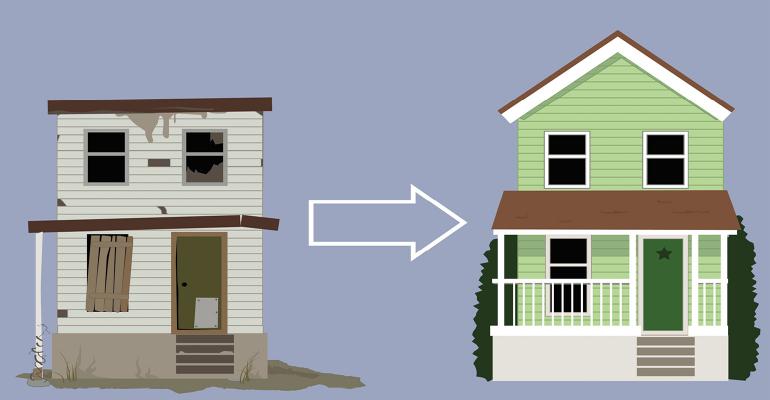(Bloomberg) -- Wall Street giants and individual retirees alike have pumped billions into financing home flips in recent years. Now, a slowdown in the flipping business threatens to rain on the party.
So-called "hard money,” which comes from sources other than banks and which carries higher interest rates, is hard to track because it’s fragmented and littered with thousands of small players doing one or two deals a year. However, a for-profit trade group called the American Association of Private Lenders estimates the number of hard money lenders and related “private money” lenders at 8,300, or up almost 40% since 2016.
Most of that money is bound for real estate investors. The volume of loans to people who are buying homes to renovate and resell rose to about $20 billion last year, according to real estate tracker Attom Data Solutions. That’s up 37% from 2016 and almost double the figure from five years ago. Attom can’t be sure how much of that comes from hard money sources versus banks, but industry players believe they make up a majority of such loans.
“There’s a lot of activity. Every time I turn around there’s new entrants,” said Glen Weinberg of Fairview Commercial Lending in Evergreen, Colorado. While he will only loan up to 60% of a property’s value, some of the newer lenders will go up to 90%, Weinberg said.
Big institutions like Blackstone Group LP and Goldman Sachs Group Inc. have gotten into the business, attracted by interest rates of 8% to 12%, as well as two or three percentage points tacked on for the lender. Today, private equity firm KKR & Co. Inc. said it would boost its commitment to Toorak Capital Partners to $500 million from its earlier $250 million investment. Toorak buys short-term home flip loans, sometimes known as bridge loans, from originators. Crowdfunding companies like Atlanta’s Groundfloor Finance Inc. have poured in, too. That company gathers up capital from thousands of small investors and is loaning about $12 million a month, primarily to real estate investors, said co-founder Brian Dally.
After a long run-up, though, things are starting to look worrisome for flippers and their financiers.
The surge in housing prices drove down flippers’ average gross return on investment -- before renovation and other expenses -- to 39% in the first quarter, an eight-year low, according to Attom. In Atlanta, investors want to put up smaller down payments lately, said Michael Braswell, a broker who works with about five hard money lenders. He doesn’t like to make loans for more than 70% of a house’s value after repairs, and getting would-be flippers to accept that is increasingly difficult.
"I would say, probably more than half the deals that come across my desk are not viable deals,” Braswell said.
Nationwide, the number of homes that were resold within 12 months of being purchased accounted for 7.2% of all transactions in the first quarter, the highest level since 2010, according to Attom figures. However, instead of being a sign of continued prosperity, it may suggest that investors are unloading their homes while they still can, Attom’s Todd Teta told Bloomberg this month.
Some Western cities are seeing big declines in home flips, including in Seattle and San Jose, California, based on the rate of those types of transactions as a percentage of all sales.
For now, hard money lenders say they’re not worried real estate investing will collapse. Groundfloor’s Dally said flippers can’t count on finding a move-in ready house anymore and flipping it quickly. Those houses have already been sold off, and what’s left are older houses that need extensive renovations. Still, there are enough such houses out there to sustain Groundfloor’s business, he said.
Jeffrey Tesch, managing director of a Connecticut-based lender RCN Capital, said luxury houses in California are too pricey to flip nowadays, but that’s not the case with lower-end homes. RCN should loan about $500 million for real estate deals this year, he said.
"For us, business is better than ever, but it’s in that workforce housing segment,” Tesch said.
To contact the reporter on this story: Michael Sasso in Atlanta at [email protected]
To contact the editors responsible for this story: Anita Sharpe at [email protected], Steve Matthews
COPYRIGHT
© 2019 Bloomberg L.P.





